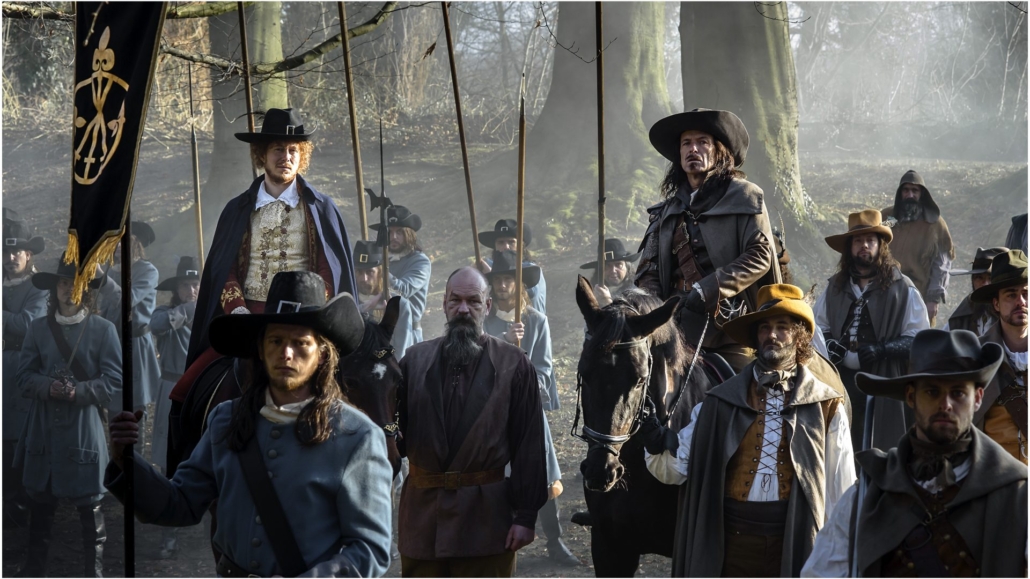EUFCN Spotlight on: Limburg Film Office
Film production in the Netherlands is mainly focused around Amsterdam, the capital. Since 2015 the province of Limburg – the most southern part of the Netherlands, with 351 km of borders with Belgium and Germany – has been developing a complementary infrastructure for film, establishing itself as a region for experimentation and new talent.
In 2020 the Limburg Film Commission was renamed to Limburg Film Office, hosting the regional Film Fund as well.
Film Commissioner Guido Franken takes us on an exploration of Limburg, a cross-border region with great opportunities for national and international filmmaking.

Chateau Neercanne
Which main productions were recently shot in Limburg?
“The number of film and television productions shooting in our region has been growing every year since 2016. Those are mainly Dutch-majority international co-productions such as the historical family films Code M. and Storm: Letters van Vuur (“Falko: Letter of Fire”), both directed by Dennis Bots, the World War II thriller Riphagen, directed by Pieter Kuijpers, and the soon to be released war drama De Oost (“The East”), directed by Jim Taihuttu. Amongst others, we welcomed the Netflix’s series Dope, German TV series Tatort and Dutch television game show The Big Escape. ”
Which productions were postponed due to the global emergency and what is set to be shooting in Limburg in the future?
“Due to the corona-crisis, the shooting of Dutch-majority international co-production Heaven, by Arne Toonen, was postponed to later this year. Moreover, a large number of short films which were planned to be shot in March-April were postponed. During the last summer months all of these productions were luckily resumed.
Besides attracting bigger audiovisual productions every year, Limburg strives to position itself as a region for experiment and emerging talent. Plenty of professional short films by new filmmakers are shot in our region. In the months to come, the Limburg Film Commission will be assisting in the location scouting for several commercials, two feature films and hopefully another Netflix’s series.”

Lichtenberg Weert
What’s the biggest production you have ever supported in your territory?
“The most intense production in Limburg was the previously mentioned feature film Code M., shot in 2014-2015, which marked the start of our film commission and of activities to promote Limburg as an attractive region for film.
The story is based in and around the historical city of Maastricht (the capital of our province) and takes place partly in the current time and partly in the 17th century. It was the first time we did an extensive location scouting, connecting local cast and crew with the production and even assisting – as far as we could – in the search for local funding. The film is a perfect selling point for our region in the mix of local, national and international talent, plenty of attractive locations (such as Chateau Neercanne, Castle of Hoensbroek and the old city walls of Maastricht) and an engaging story based on a local history, suited for an international audience.”

Code M. ©Bijker-FilmTV
What do you think is something unique the region of Limburg can offer to the film industry?
“Limburg is the only region in the Netherlands with hills (although we love to call them mountains, as the rest of the Netherlands is completely flat). With wide landscapes and relatively few inhabitants, it offers a lot of mental and physical space for filmmakers to develop and produce, together with a personal and helpful approach. Located between Belgium and Germany (just a 15 minutes drive), 1 ½ hour from Luxembourg and only 4 hours from Paris, this cross-border region offers great opportunities for international co-production. We work in close cooperation with partners just across the border and can connect you easily with, for example, co-producers in Flanders, Wallonia or Germany.
Within our own region there is an extensive network of talent, industry professionals and services, so we can provide productions with all they need. Last but not least, we are the only region in the Netherlands that offers assistance from the film commission as well as possibilities for local funding through our regional film fund.”
Do you have any particular anecdote related to your experience as film commissioner?
“In general, what I like the most is seeing that the local audiovisual industry is growing every year and that with the right support and mindset you can make plenty of things happen. If anyone would have asked someone 10 years ago about film or filming in Limburg, people would have started laughing. Now we have a small but impactful local industry and an attractive infrastructure from talent development to production and distribution. In addition to everything that happens in Amsterdam, we see that our industry brings more diversity, a different approach to the medium, and ways of producing that add value to the whole film industry in the Netherlands.
We were particularly amazed at the heartwarming experience we had during several shoots, when local inhabitants welcomed the cast and crew with typical pastries and cakes. For some people this is a further advantage of our region: locals really like productions, cooperate and help the crew in a heartwarming and friendly way. Location and production managers frequently bond with them.”

The White Town of Thorn
What activities has your film commission been carrying on during these challenging months and how are you handling the gradual restart of production in your country?
“As a coincidence, the time of the lockdown coincided with our transition from a film commission to a ‘complete’ film office, hosting the regional film fund as well. We used these months to talk with the local industry about their needs and possible changes, set up the regulations for the fund and revise our industry guide and protocols. Certainly, we have collected experiences and data on the impact of the corona-crisis on the local industry and reported them to our regional government, as well as informing our industry on Covid-19 protocols and support schemes from the national and regional governmental institutions.
After a green light for productions, we assisted filmmakers in setting up their shooting plans, and launched the regional funding schemes in order to support new projects as quickly as possible. We currently keep on lobbying for (more) support for the industry. We are glad and happy to see that shooting is starting again and are looking forward to assisting everyone in the best possible way. ”
The European Film Commissions Network is a non-profit association that supports and promotes the European film industry and culture. It currently represents 98 European film commissions and film institutions from 31 different countries.

 Bea Borgers
Bea Borgers Vladimir Mudrovcic
Vladimir Mudrovcic